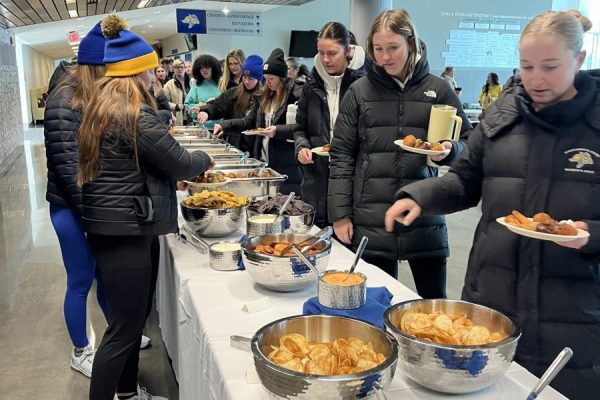Meat lab on a mission to educate
February 28, 2012
Whether a student is interested in meat science, looking for a job, or simply wanting to order up some meat to take home on break, the Meat Lab is the place to start.
According to SDSU Meat Lab manager Adam Rhody, the Meat Lab was founded on three main goals. Teaching is one key component. Classes and judging teams that are hands-on require carcasses. The Meat Lab harvests the animals needed for those classes. Students also gain experience in learning how to harvest animals, an educational mission at the Meat Lab.
“That’s where we find our niche,” Rhody said.
Research and extension are the other two key goals the Meat Lab aims for. During the summer the meat science department sponsors demonstrations around the state. Educating people on food safety and how to properly handle and grill meat is a major component of these demonstrations.
The Meat Lab gets its meat from a variety of sources. According to Rhody, many of the animals raised at the SDSU livestock units are undergoing specific trials and studies for research purposes, so little meat comes from those units. The Meat Lab does get some of their cattle from the SDSU feedlot. However, in order to supply a variety for classes and judging teams to look at, they also turn to local producers in the area.
Retail hours at the Meat Lab run Thursday and Friday from 1 p.m. to 5 p.m. In order to sell quality meat over the counter, the Meat Lab facilities undergo government inspection every week when harvesting animals. Beef and pork are processed at the Meat Lab. Lamb is also available, but it is a more seasonal product.
Rhody said that although they do sell products at the Meat Lab, making money is not the primary focus. Retail is simply a means of recuperating some of the money going into facilitating extension, teaching and research.
“We try very hard not to compete with local businesses,” he said. “That’s not our goal.”
According to Rhody, the SDSU Meat Lab holds some unique opportunities for students. Intro to Meats 241 is the most hands-on meats course at any college. This involves harvesting the animals. Students also go through the entire procedure of fabrication and meat processing.
Rhody said there is a lot of responsibility and liability involved with bringing students into the Meat Lab. Even so, the meat science department feels it is important for students to have the chance to learn more about the ins and outs of meat processing.
“Some places are cutting back on that. I feel we’ve expanded on that and gone the other way [by] becoming more hands-on,” Rhody said.
Student workers at the Meat Lab value their time in the lab.
“I’ve learned a lot about processing and fabrication of meat products. By being here and working on a daily basis I know what to expect and the basis of the industry,” said Kim Arnold, a senior animal science major.
According to Rhody, meat science is a field students should come into with an open mind.
“You don’t come out of high school saying I’m going to be a meat scientist,” he said. “You have to try it out and see what works for you and what doesn’t.”





















